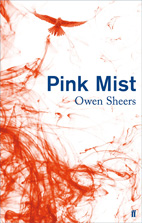This week, a student introduces us to Owen Sheers, whose play Pink Mist he is writing about for his A Level coursework:
 “Owen Sheers’ Pink Mist is a verse-drama about three soldiers and their time in Afghanistan. We are given a brutal story of the lasting effects of war on each one, though to what extent these lasting effects are on the soldiers themselves differs greatly. What I found interesting is a phrase that is repeated at the beginning and end of Pink Mist: ‘Who wants to play war? Who wants to play war?’ The first appearance of this repeated phrase is at the end of a stanza describing the soldiers’ childhoods – they were of course ‘Just three friends who’d once linked arms at school’. The position of this statement is Sheers making a bold statement – the end to this playful childhood was at the ‘chanting’ for the game of war, with the next stanza beginning ‘Jump cut to ten years later and the answer was us, we did.’
“Owen Sheers’ Pink Mist is a verse-drama about three soldiers and their time in Afghanistan. We are given a brutal story of the lasting effects of war on each one, though to what extent these lasting effects are on the soldiers themselves differs greatly. What I found interesting is a phrase that is repeated at the beginning and end of Pink Mist: ‘Who wants to play war? Who wants to play war?’ The first appearance of this repeated phrase is at the end of a stanza describing the soldiers’ childhoods – they were of course ‘Just three friends who’d once linked arms at school’. The position of this statement is Sheers making a bold statement – the end to this playful childhood was at the ‘chanting’ for the game of war, with the next stanza beginning ‘Jump cut to ten years later and the answer was us, we did.’
“To ‘play’ war is a timeless concept – there is even evidence of toy soldiers being found from ancient Egyptian times, and there are plenty of modern-day examples of children’s war games. Sheers shows how easily normalised it is for a child to be ‘playing’ with arguably the most brutal of human activities – he shows us how three seemingly innocent children progress into soldiers making the high-jump record from activating an IED (Improvised Explosive Device) or accidentally killing the two-year-old child of an innocent Afghan farmer.
“Perhaps this may seem to be an extreme touring of the brutality of war written to shock the audience – the title itself is an allusion to the vivid image of what happens when a person is blown up (‘Pink Mist’) – but it is, if anything, a diluted presentation of the reality. For example, just a few months ago reports were released about Australian Special Forces murdering 39 Afghan civilians – even killing seemingly harmless prisoners to claim their ‘first blood’, as if it were a game to compare ‘scores’.
“Reading or watching a performance of Pink Mist will not give you a rush of adrenaline. You will not have patriotic ideas shoved down your throat, or a harsh critiquing of every soldier’s actions presented from the peak of moral high ground. Instead, you will be left with the bitter taste of war – it is not a game, nobody wins.”
It’s not only this student who has been struck by the play – it’s a powerful work. As Kate Kellaway said in The Observer, so clear sighted is the play about war ‘that it should be studied at school alongside the ubiquitous Wilfred Owen.’ She continued, ‘The book should be required reading for anyone considering a career in the army. But this is not anti‑war propaganda. It is not that simple.’
Here’s a review of the Bristol Old Vic production.
And to explore Sheers further, here’s his own website. He is a prolific writer, turning his hand to poetry, drama and novels. You might try his thoughtful and varied poetry collection, Skirrid Hill – some of you will have studied the poem ‘Farther’ at GCSE. Or you could try his moving novel Resistance, which imagines what happens in a remote Welsh valley after the D-Day landings fail and the German Army invades and occupies Britain. And that’s just for starters. As you will see from his website, there is quite a variety to choose from, written by the man who was once writer-in-residence with the Welsh national rugby team.
Read more: Time and Change in Owen Sheers’ Skirrid Hill